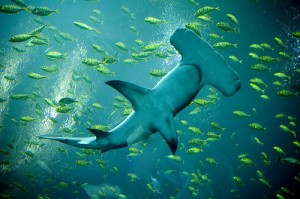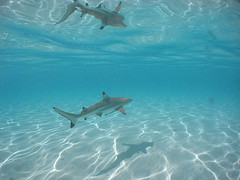 The other day, just as I was about to go out on the water on a nine-foot piece of epoxy-covered foam, a man stopped me on the beach. “Aren’t you scared to go out there by yourself?” he said. “Because of the sharks?”
The other day, just as I was about to go out on the water on a nine-foot piece of epoxy-covered foam, a man stopped me on the beach. “Aren’t you scared to go out there by yourself?” he said. “Because of the sharks?”
I had been trying to forget about them, even though the sun was setting, the water murkier by the minute. So I mumbled something that I’ve heard other people say, that I was going into the sharks’ territory, that I was the uninvited guest. I also held up my paddle, as if to say I could give a shark a good whack if I had to.
On the water, I told myself to remember that I’ve only seen small leopard sharks here. Plenty more species had probably seen me, and started swimming the other way. But still, I watched the beach as closely as I watched the waves—hoping that a jogger or beachcomber would be able to hear me, just in case I had to yell for help.
We actually have a lovely book about sharks, which starts with a person swimming along merrily in the sea, when, all of a sudden—SHAAAAARK!
And then the page turns, and there’s a tiny, smiling illustration of a dwarf lanternshark, the smallest of all the sharks. (As the book says, it’s only a bit bigger than a chocolate bar, and has a bioluminescent belly, which makes it even more charming.)
The words used for sharks—and for so many other things—color my experience of them. The swell sharks on display at the local aquarium, docile enough for toddlers to pet them, seem truly swell—even though as having stomachs that can inflate to keep them lodged among the rocks or intimidate predators. Basking sharks and nurse sharks seem harmless, nurturing; dogfish obedient. Great white sharks have large white underbellies, but also great white teeth.
A recent paper looked at the language surrounding what the authors call “human-shark interactions.” In news stories, in policy-making, in conversation, these events are usually referred to as shark attacks, even though the term implies a motive on the shark’s part—and often is applied to encounters where shark and human never actually make contact. Using more accurate descriptions of these events, whether “shark sighting” or “shark bite”, might give a better picture of what’s happening in the water.
My shark book starts to wrap up with some of the other things happening between people and sharks in and out of the ocean, with illustrations of everything from sharkfin soup to sharkskin shoes. (It was probably trickier to explain bycatch and habitat loss with a single, simple drawing.) And the last page always gets a delighted laugh from small listeners—a snorkel-wearing little boy chasing down a series of sharks, and the words: “If you were a shark…the last word you’d want to hear would be HUMAN!”
Even the scariest shark words seem to be losing their impact in the face of actual threats. This week, California’s Fish and Game Commission decided to pursue possible state endangered species status for the great white shark.
I’ve been trying to reframe my view of sharks—thinking about their contribution to ocean ecology when I’m in the water, correcting myself during an interview with a researcher studying shark bites when I blurted out “shark attack” by accident.
But perhaps the sleek, sublime, submarine thrill of a shark will never be dampened, no matter how carefully we tread. Earlier this week, my son and I were looking at some new waterfronts signs that detailed the marine life in our nearshore waters. After talking about the pictures for a while, he said, “I wish I was a fish. No—I wish I were a shark. A great white shark.” He rolled the word around in his mouth—it’s such a fun one to say, it feels fast and powerful and surprising. It feels sharky.
 I asked why. “So I could have big teeth and eat everything. Whales and seals and fish and you.” He smiled. Toothily.
I asked why. “So I could have big teeth and eat everything. Whales and seals and fish and you.” He smiled. Toothily.
It was hard to fault him for wanting to be an apex predator, and for looking so gleeful about it. Gleeful was how I felt, too, standing out on the water, my paddle in hand, the sun setting and every wave mine. Although I couldn’t help squinting at the shadows that passed underneath me, once my fin hooked into the face of a wave, my eyes were only on what was in front of me. And for a moment, I thought about sharks just as little as they think about me. Which is to say, not at all.
**
Images Top: bryan scott photography Middle: Joe Mudd Bottom: Ros in wonderland
One thought on “Afraid of the Shark”
Comments are closed.